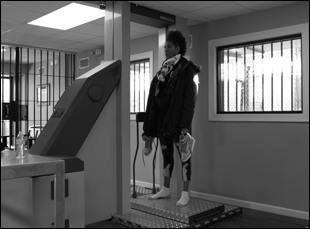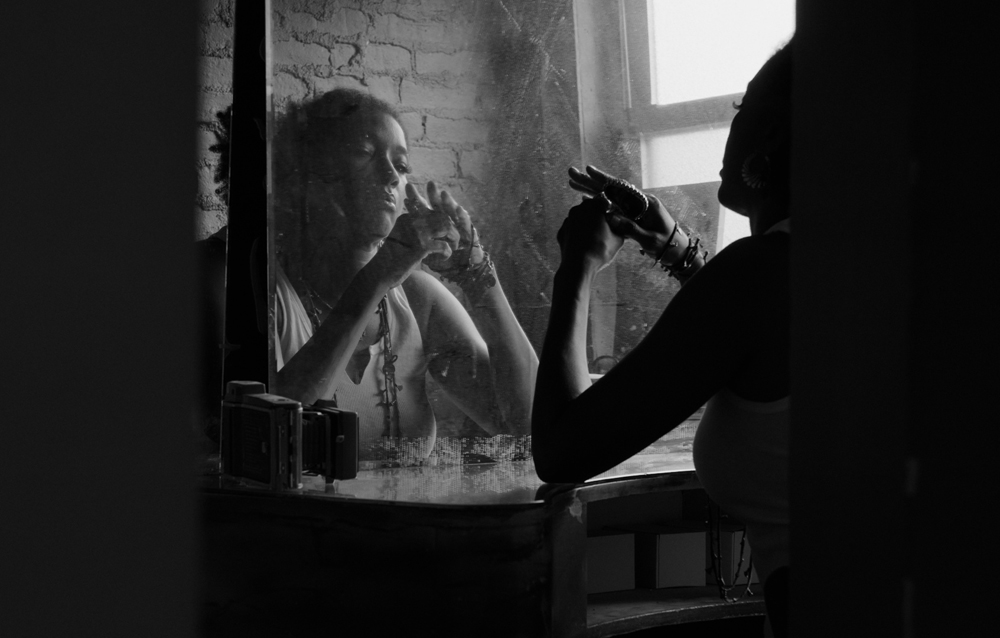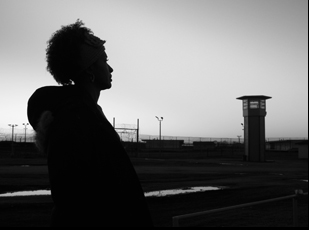“I like looking at issues through one person’s story because I think you can absorb a lot more sometimes,” said Cinque Northern, who knew he was onto something when following the playwright/performer Liza Jessie Peterson into the Louisiana State Penitentiary in Angola, known as the farm for its roots as a slave plantation, for his film “Angola Do You Hear Us?” “The goal of this wasn’t to examine the systems of Angola necessarily, even though I think you get a taste of it. The goal of this was to tell one story and by telling that one story, you learn about something much bigger.”
Just how big Northern couldn’t know until Peterson’s performance of “A Peculiar Patriot” was shut down midway through when the play, in which the dramatist imagines herself visiting prisons to give hope to the incarcerated and their families. The one-woman show was drawn from Peterson’s own awakening of being invited to teach poetry at Rikers Island and gaining as much of an education as she was imparting upon visiting other prisons across the country and seeing how the penal system disproportionally kept men of color locked up, appearing far less as a place for rehabilitation that could lead to productive futures than resembling a past of slavery. At Angola, this historical parallel is especially stark, if it can be called a parallel at all when the incarcerated are still asked to pick cotton, corn and okra in the fields as part of their sentence and when Peterson was able to use the play to hold up a mirror to the audience at Angola, the questions being raised made the prison officials uncomfortable when it clearly engaged them.
Shortly before Peterson took the stage, she was forbidden from filming the performance at all as had been planned, but much like the impact of her words on the community at Angola couldn’t be denied, a lack of footage didn’t stop Northern from making a powerful film when “Angola Do You Hear Us?” recreates the fervor in the room with animated sequences brought to life with the recollections of the men who witnessed it and ably channels the sensation of epiphany that not only they experienced, but Peterson did herself as well. The film also shines a spotlight on the ongoing work of Norris Henderson, a former inmate at Angola who was wrongfully imprisoned for over 20 years and has since dedicated his life to criminal justice reform with the organization Voice of the Experienced (VOTE), actively helping the currently incarcerated and recently paroled find their footing.
Only weeks removed from its premiere at the Telluride Film Festival, the film has already made an extraordinary impact, recently explained Northern, who developed a strong reputation as an editor on such films as “My Name is Pauli Murray” and “The One and Only Dick Gregory” before getting behind the camera for “Angola,” and audiences everywhere don’t have to wait long to see it for themselves with a release this week on Paramount+. The filmmaker generously took the time to talk about how his experience as an editor came in handy when piecing together the event he and Peterson were prevented from filming and the extraordinary aftermath of that day that continues to change the lives of those that were there.
It came about bit by bit. A few years before we went to Angola, [Liza and I] had mutual friends and we got in a conversation where she told me she was working with young people at Rikers. In the back of my mind, I thought I would love to do just a short piece, nothing on the scale of what it ended up being, but I wanted to turn up the work that she was doing using a film. Fast forward to a couple of years later, she asked me to record her visit to Angola. And I wasn’t sure what I would do with it, but I said, “Let me go and record this” and I didn’t really know what I’d do with it. We partnered with Catherine Gund, who had been wanting to make a film about Liza for years, so it became a nice partnership between the three of us to make this film.
What was Norris Henderson’s role in all this?
None of this happens without Norris, it turns out. He’s been out 18 years now but he was formally incarcerated in Angola and he is very active [now] in helping men reintegrate when they get out. He’s very respected both by the administration and the men of Angola. He’s gotten laws changed and he’s gotten governors elected because he’s really empowering that community as they leave Angola and come home and has politicized them in a way that the men on the inside are able to reach out to their families on the outside and make them more open to voting. Norris is also really the reason why Liza was able to go into Angola and he was really our guide into Angola.
What was it like for you being there in Angola?
I had no idea what we would really experience, but I knew what they would show us would be just one portion of the prison. They actually have a lot of public facing events, nothing like what Liza did there, but they do have other events and it’s a huge prison, so going in there, I was just open to whatever it was that we were going to experience. I was familiar with [Liza’s] work and I know the impact she can have on people in a room, especially when they’re incarcerated men, so I never had any fear and even throughout the experience, I never felt unsafe in any way because the activation that they had was very much like waking up to a situation, so I was really hoping that there would be connection. But there was no way I could’ve guessed in what way it was going to happen. Once they shut us down, then it became a story, and I just wanted to tell the story of what I saw in the room that day and Liza’s journey to get to the room that day.
With your editing background, I wondered if I was trying to decide whether this was the dream situation with your editing background to find creative solutions for not having performance footage or it was a nightmare when there were so many obstacles to filming.
It was both! I really thought I was going to get footage of this moment of her performing, but they responded in a much bigger way and I think a lot of the things that make the film unique came from something we just could not have. The combination of them shutting the play down and why they shut it down and the impact it had on the men…it wasn’t until they started having phone calls reaching out to Liza and Liza started talking to them through their wives, who would call them and we’d be on a threeway [call that it started to take shape]. When we started talking, she said, “They’re all calling me, so let’s just get them to tell us their story of what happened that day and we can piece it together.” When the men started calling and giving their own accounts, it was just such an emotional [experience]. There’s hours of it, and a lot less in the film, but there were some really powerful stories that they tell about what that day meant.

We had to have enough of it in there so that the viewer had a sense of what these men were actually seeing because if we told the whole story and you never saw what the men saw, you wouldn’t be able to connect to why they were responding if you hadn’t laughed or you hadn’t been shocked in some way by the play itself. So I tried to use the archival footage always to push the story forward — of Liza performing the play at Woolly Mammoth, so if she was talking about researching information then the play would be her performing that information so that it felt seamless to the story. There were times when there was too much of it in there and times there was too little of it throughout the editing process and we just tried to find that right balance.
What has it been like getting this out into the world?
The reception has been mind-blowing. You don’t always know, especially in documentary where things are always unfolding and you’re trying to solve issues and you sometimes don’t quite know what you’re making, but it’s just been a whirlwind for all of us. I’m just really glad to spark conversations and empathy and emotions around this very complicated issue. I think that’s the role of art and I look at this as looking at the impact of art and storytelling can have on people. The power of art to impact situation is something that myself, Liza and Catherine Gund are all very aligned on and we just learned this ourselves what happened that day is still echoing [in Louisiana]. A lot of men have had their cases reviewed and have come home because of how activated they were that day, so it not only inspired them, it politicized them, so they plugged into Norris’ organization and over 200 men have been released since Liza was there two years ago versus one or two of them getting out in years, which would be typical.
[We had this] screening in Louisiana where we screened it for some formerly incarcerated people, some people who work with Norris Henderson’s organization VOTE and then also families of people who were formerly incarcerated and there were seven men in the audience who had been in the room when Liza performed and are now out. And I was really curious…[about] this audience more than any, like what do you think about what we did, did we get it right? And it turns out the impact was even bigger really than what we thought. There was a man who was formerly incarcerated there who now has a restaurant and he employs other formerly incarcerated men, and there was another man who now works with young people to keep them from getting tied up in the system. These are people now able through Norris’ organization to contribute to society in a meaningful way, so that screening was really, really powerful and the reception from both the formally incarcerated men in Louisiana and screening it for people in Telluride and watching them have the same response — I couldn’t be more happier with that outcome.




